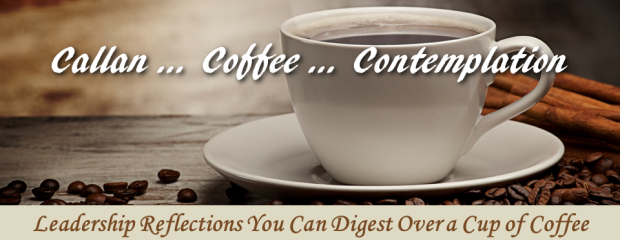Callan…Coffee…Contemplation for the Week of August 11th
A Still Point
A condition today’s leaders will have to confront is the widening band of white noise—distractions of all sorts—generated by technology and information systems. I like to imagine this increasing overload of information as a rapidly spinning wheel, expanding its centripetal force, creating within people feelings of disjointedness, mania, and incoherence. I believe it’s a leader’s obligation to find, in the words of T.S. Eliot, “a still point of the turning world.” The way leaders can find this still point, a trusted fulcrum, is by identifying for their groups edifying principles, unifying aspirations, givens, and yes…some timeless absolutes. Today, more than ever, we need to remind people that there are transcendent principles in leadership to which they can cohere and in which they can trust. Things like honor, courage, service, sacrifice, willing obedience, and fidelity. These absolutes help us find that still point, a place of clarity and confidence, and once found, that still point helps us maturely manage the ever-turning world.
Elders
My mother is fond of saying a person’s face and body language, later in life, start to reflect their true inner world and character. Those whom are integrated are mellow, positive, and smiling; those who are not are rigid, toxic, and frowning. At the very time in life we need them to be generative, many have actually regressed to become bitter. Yes, we do see some vibrant wise elders around, but we just don’t seem to value them. We do a lousy job of incorporating wise elders into our groups because our society values youth, good looks, and instant gratification more than it values wisdom, discernment, and the balanced mellowness of a well-lived life. So, what to do? We need to find ways to not only generate more wise elders in our society, but also seek to actively incorporate wise elders into our groups. And why is this important? Because history reminds us that no society has long endured unless elders were expected (and allowed) to pass wisdom to the young.
The Sage
I believe the definition of truly masterful leadership is when the leader becomes the lesson. In this definition, the “leader as lesson” is akin to the classic concept of the sage or wise man. Here I am not referring to a shaman or soothsayer; rather, to someone who has mastered oneself and integrated the inner and outer dimensions of life and leading. Sadly, this classic concept of the sage is diminishing in its importance and its expectation in our society. Most people today are taught that the end state of their development as a person and leader is personal success; to gain acclaim, notoriety, position, and status. That’s it—end of the road. The problem with this paradigm is it creates a population of leaders trapped in a diminished vision of thinking locally and living locally, with no elevating ambition beyond their private worlds. We need to rekindle a vision calling for leaders to break free from a self-focused paradigm of personal success and move outwards…to become seekers—and discover ways to expand their knowledge and wisdom. Sage leaders, true wise men, think globally and act locally.
The Voice of Conscience – Part 1
When we’re young and beginning as leaders we are in many ways testing ourselves–our limits, thresholds, and beliefs. In a basic sense, we mostly know right from wrong, strength from weakness, good from bad, but as a natural condition of youth, we test those boundaries. One such test is of our conscience. What is at play in these formative years, when our conscience is tested, is the making of either good or bad habits. And like any habit, habits of conscience, with practice, can be made either stronger or weaker. It’s as simple as this: We can either learn to hear the voice of conscience, or learn to ignore it. If we hear it, our conscience becomes a strong guide to elevated character, trustworthiness, and integrity. If we ignore it, we fall to the siren’s call of our lesser angels. The Jewish tradition warns of this pitfall through this wise aphorism: Bad habits enter our lives first as invited guests, before long they become family members, and ultimately—they take over the house.
The Voice of Conscience – Part II
When we wrestle with our conscience we are waging a fight to determine what kind of person we will be. In this fight, our conscience calls us to our higher self, but our ego sometimes calls us to our lesser self. This wrestling match determines which call we will honor. But in this fight we can actually lose by winning. If we determine winning to be getting what our ego wants—greed, self aggrandizement, revenge, power—then what initially feels like winning is, in the long term, losing. To really mature as individuals and leaders we actually have to lose this fight with the conscience—to not get what our ego wants and to be forced to sacrifice, and suffer, the loss of ego gratification. And in doing so, reach constantly towards our higher self. It often hurts our egos to take the high road because we don’t get what we want. But in truth, it hurts far more to take the low road. When we take the low road, we often get a prize that wasn’t truly worth gaining, or far worse, we get neither the prize nor our honor.
Check back next Monday for a round up of this week’s social media shares. Or check us out on Facebook,Twitter, Google+, or Pinterest to see our posts every day!
Tweet Share






